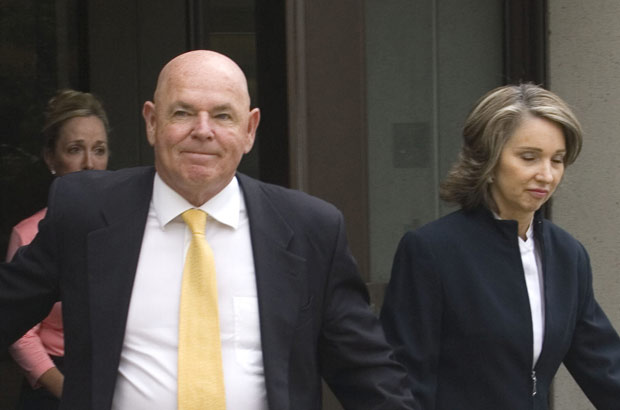

In a decision read to a packed courtroom Friday, Cunningham affirmed that O’Brien’s alleged conduct falls within the scope of the two Criminal Code sections under which he has been charged.
By doing so, he may have, for the first time, put some judicial definition to what constitutes unacceptable conduct in the world of back-room political dealing in appointments.
O’Brien is accused of offering former mayoral rival Terry Kilrea an appointment to the National Parole Board in exchange for his withdrawal from the 2006 mayoral race.
In asking for a directed verdict dismissing the charges, O’Brien’s lawyers argued the Criminal Code sections don’t apply to appointments negotiated purely to gain political advantage.
If they did, they contended, the law would criminalize Senate appointments made to open up seats for star candidates or deals in which opposition MPs cross the floor to accept cabinet posts.
But Cunningham said the aim of the two sections is to preserve government integrity by protecting against the corruption of our democratic system, within which the appointment process occupies an important place.
“Appointments to government offices such as the National Parole Board are not to be traded for political favour,” he said. “They are appointments that must be made in a fair, open and transparent manner. To do otherwise is to do harm to the integrity of government.”
The ruling appeared to stun O’Brien and his entourage of family and friends. Before Cunningham entered the courtroom, they were almost giddy, laughing and chattering in a manner reminiscent of students on the last day of school.
O’Brien had even tentatively scheduled a series of media interviews and TV appearances on the assumption the ruling would go in his favour. But as the judge read his decision, O’Brien became visibly more subdued. By the time he left court, he had resumed the Sphinx-like silence that has been his trademark throughout the trial.
Michael Edelson, O’Brien’s lead lawyer, told the court he’d take the weekend to review Cunningham’s decision and advise the court and Crown attorney Scott Hutchison by next Wednesday or Thursday whether the defence will call evidence.
Hutchison, who completed the Crown’s case June 2, is especially keen to know whether O’Brien will take the stand in his own defence. While that’s considered unlikely, Edelson promised to advise Hutchison of that next week.
While the trial will continue, it would be wrong to read into Friday’s ruling any indication of the judge’s assessment of O’Brien’s guilt or innocence. That will await the end of the trial.
Nevertheless, a striking feature of Cunningham’s 24-page judgment was his acceptance of the Crown’s position on every substantive legal point. That came as a surprise to some because Cunningham had appeared skeptical of some of Hutchison’s arguments during submissions on the directed verdict application earlier this month.
There was none of that Friday, though. A key defence argument turned on the meaning of the phrase “advantage or benefit of any kind,” which appears in both relevant Criminal Code sections.
The defence had argued that higher courts had defined the phrase to mean “material economic advantage.” But Cunningham said that interpretation was taken out of context; the courts meant only to exclude trivial benefits.
O’Brien alleged conduct would fall within the section’s purview if the public perceives it as dishonest. “The perception itself, and not its factual foundation, determines the criminality of the conduct.”
The law, Cunningham said, “is clearly aimed at preventing influence peddling in order to protect the public’s confidence in the integrity and appearance of integrity of the government.”
If that’s its purpose, he said, “any offer of a benefit or advantage made by a person having or pretending to have influence with the government … would, from the perspective of an ordinary, reasonable member of society have the appearance of compromising the government’s integrity.”
Cunningham agreed that it was likely never Parliament’s intention to make it a crime for a politician to offer a Senate appointment or ministerial position to obtain a political advantage. “Ultimately, such matters will be dealt with at the ballot box,” he said.
However, to exclude the conferring of all kinds of political advantage in exchange for appointments from the scope of the law “may seriously compromise the public perception of honesty and integrity of public officials.” That, in itself, would be “absurd,” he said.
Cunningham also rejected defence arguments that the law didn’t apply to discussions or negotiations between parties, such as O’Brien and Kilrea, who aren’t in a position to influence an appointment.
“In my view, some exchanges wherein the parties lack the ability to produce what they offer will undermine the public’s confidence in the neutrality of the appointment process simply by taking place,” the judge said.
“In these instances, the process of soliciting, negotiating or recommending will be viewed as morally blameworthy, and will jeopardize the integrity of government officials.”
Cunningham concluded that a reasonable jury, property instructed, would be capable of convicting O’Brien if the Crown was able to prove its case beyond on reasonable doubt. On that basis, he said, the trial should continue.